Story by Jess Daniels / photos by Alycia Lang and Jess Daniels
One of Fibershed’s first official artisan producers, Monica Paz Soldan of Tiny Textiles in San Francisco, is a self-proclaimed “comfort junkie.” Stepping into her Portola home on a drizzly San Francisco day wraps you in this sense: the walkways and floors are lined with the rich textures of her collection of antique rugs, while the dining table offers a still life replete with yarn, candles, freshly-dried coreopsis seeds, and a scattering of seashells.
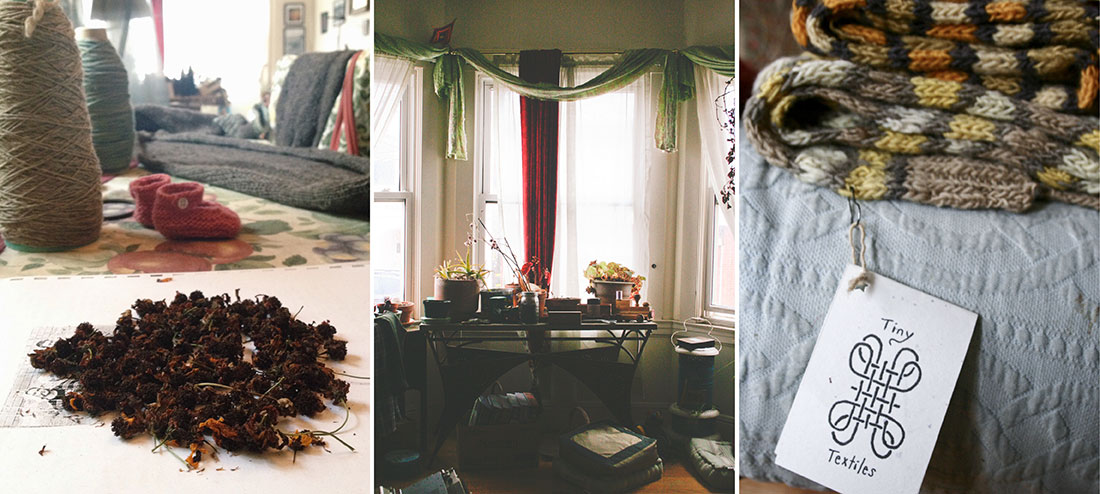
Monica and her partner have lived in this home for more than 12 years, but are now readying to relocate. Once the landlord puts the house on the market, they face a difficult series of decisions as they try to find affordable land that, ideally, lies within the bounds of the fibershed. Monica has extensive farm experience including food and fiber production, but says that fiber is not part of the immediate vision for the land they seek. Creating “seed to finish” products is time-consuming in itself, so adding full-time farm animal care would push the limits of their work capacity.
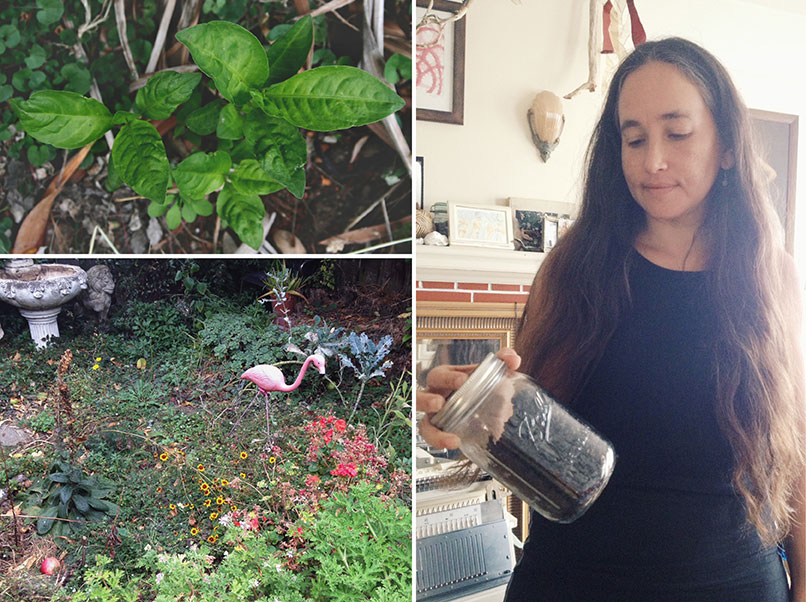
For fiber, Monica looks to Sally Fox for her Merino wool, Julie and Ken Rosenfeld for alpaca yarn, and Cormo wool from Merry Meadows Farm. The yarns provide the foundation of her color palette, accented with dyes from her backyard color library: fermented and fresh indigo baths, coreopsis, pokeberry, madder, and weld. When describing her dye processes, she uses the example of abstract painting: moving beyond perfected technique to achieve purposeful imperfection, like marbled colors and variegated skeins that blend woolen browns with the many depths of indigo.
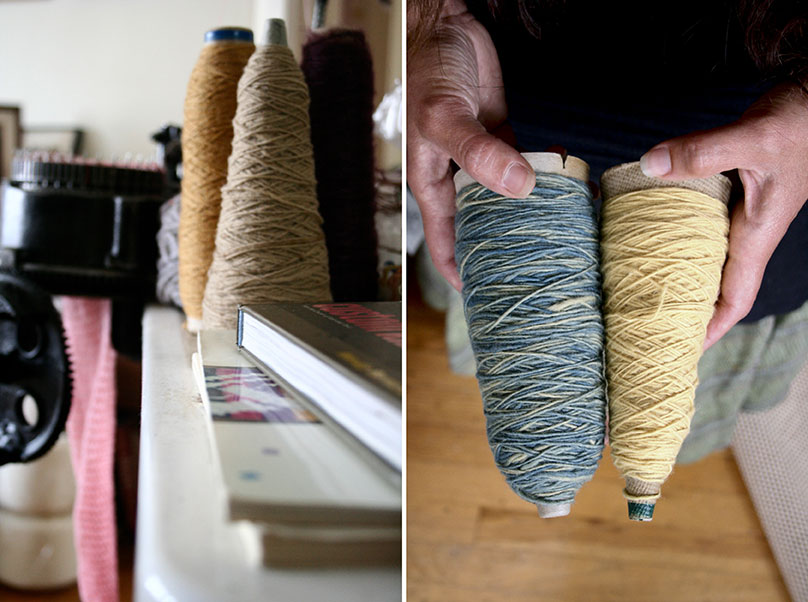
Monica’s knit designs similarly embrace her source material. A lifelong knitter and weaver, she learned cut and sew techniques from her Welsh grandmother, the finery of garment tailoring from her Peruvian uncle, and a vocabulary of stitches from Mary Thomas’ Knitting Book. With each design, Monica chooses stitch styles to orchestrate the garment’s function, creating patterns that “make the fit joyful” by incorporating a decorative pattern that also serves to allow the garment to stretch, or layering textured stitches that create drape and thickness.
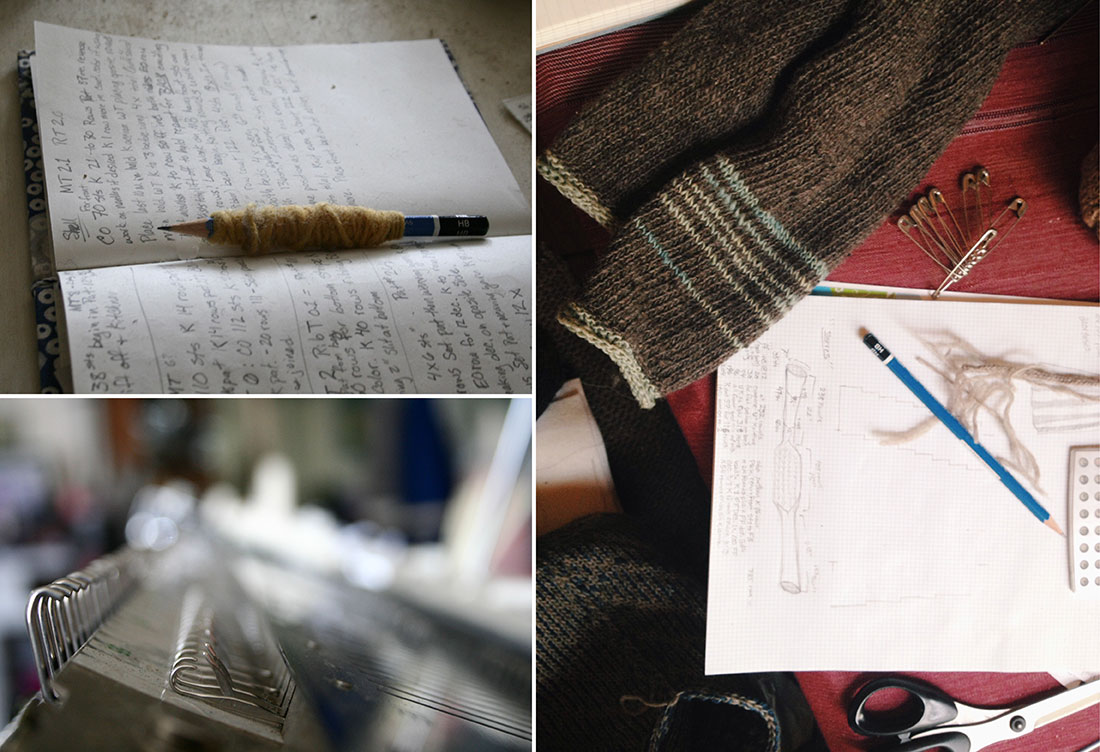
Tiny Textiles began as Monica’s home production—first just knitting for friends, and then expanding her reach as friends began to request gifts for their friends. She connected with Rebecca at one of the initial presentations that hatched the fibershed wardrobe project, and has since looked to fibershed to help amplify her marketing and web presence, and connect with other producers near and far.
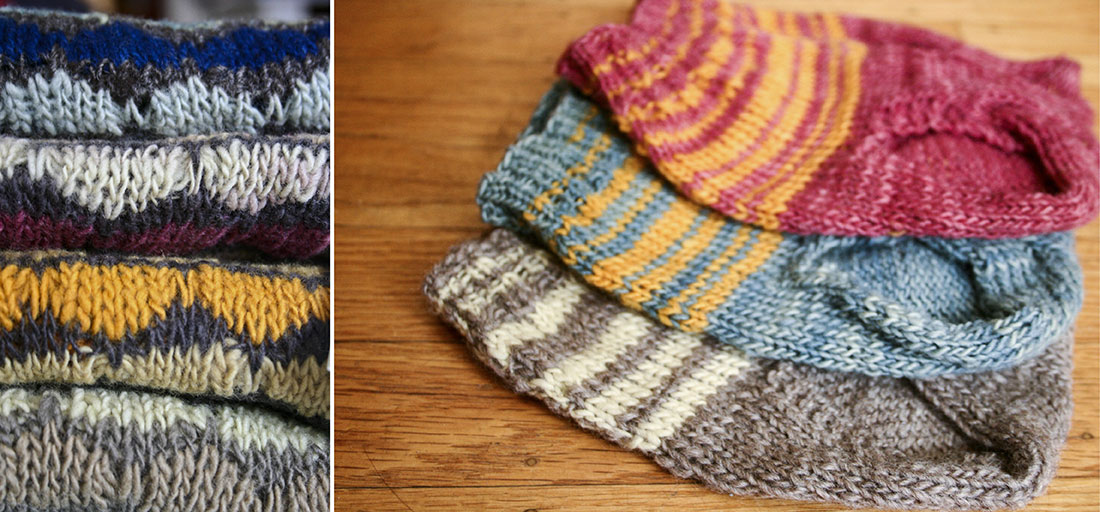
After exploring Monica’s knitting process, we head to the garage and are immediately met with the hulking frame of her automated loom, surrounded by boxes overflowing with finely-spun indigo spools. The cream-colored twill on the loom, she explains, is the latest prototype for the fibershed denim project now three years in the making. Prior to this, Monica mostly used the loom for “artsy wool pieces.” But it has been a long and patience-testing research process to ultimately develop yardage using Capay brown yarn, dyed with fibershed indigo, woven into a “raw denim” style 3×1 (3 floating wefts) twill, to be washed, blocked, cut, and sewn into (very) limited fibershed denim.
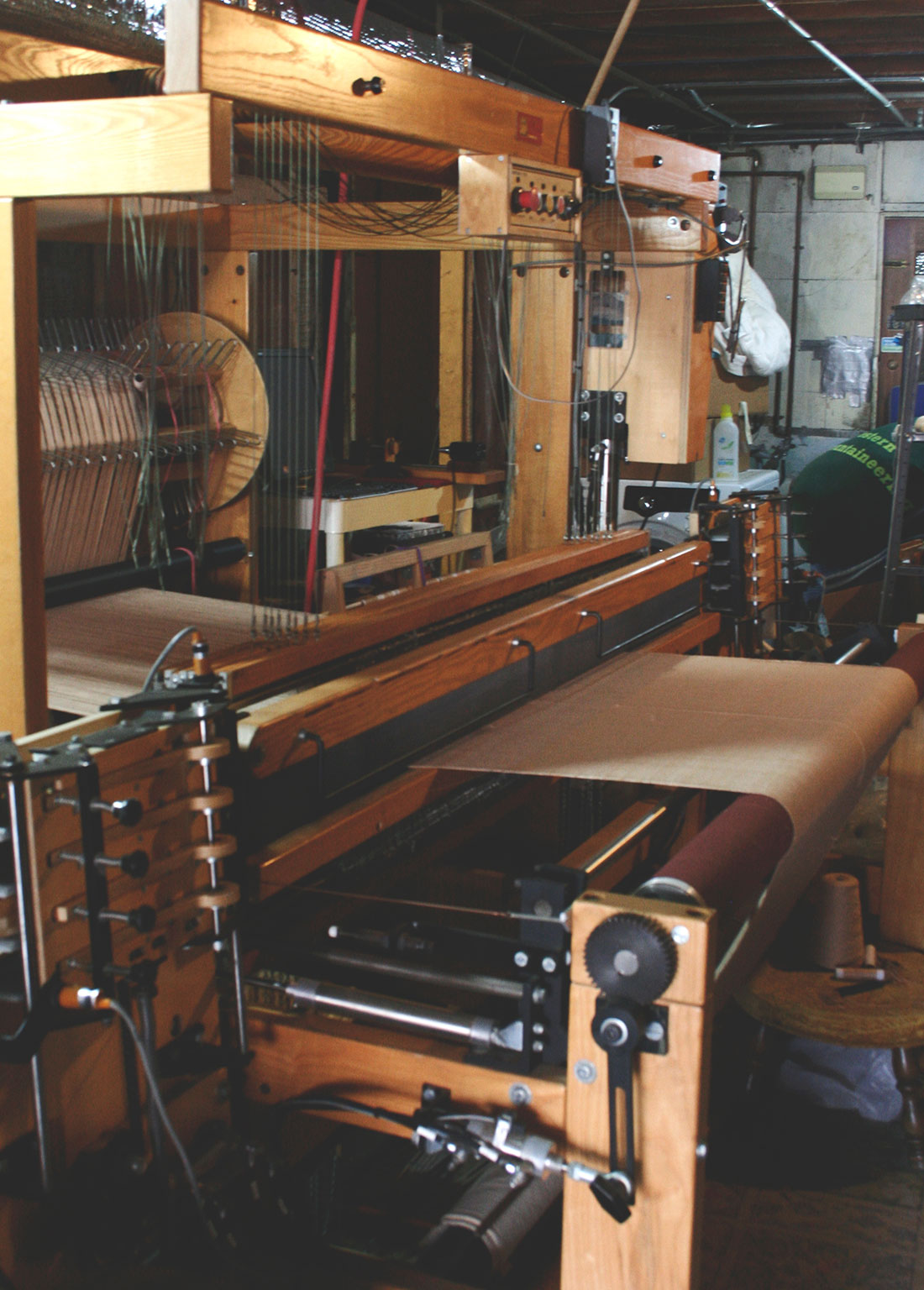
The jean project has local significance not only for the materials used but also for honoring San Francisco’s heritage as the birthplace of denim. Bringing this history into modern fibershed production has required another renaissance: research based on late nineteenth century methods for weaving sail cloth with short-staple cotton. She uncovered this source while searching for weaving techniques that balance the delicacy and strength needed to not break the cotton. The iterative process of creating yardage from fine cotton has combined several techniques, from utilizing the loom’s silk setting, to reducing the automation, and wrapping the warp in paper. Though she’s nearly ready to begin production with the blue yarn, one conclusion from the trials of her research phases is that you’re “not supposed to do this.”
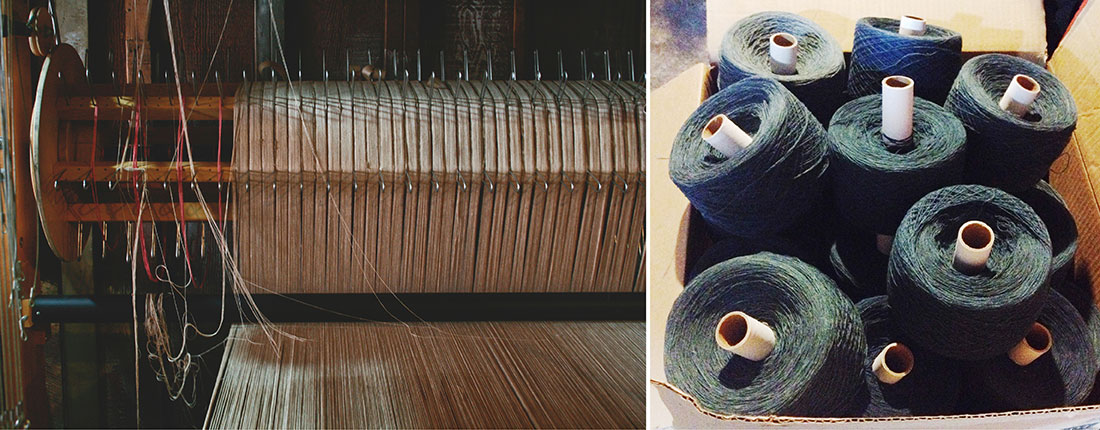
For many, this conclusion would have been drawn sooner, and would likely have halted the project entirely. But with each broken warp thread, Monica has sought not only technical improvements, but philosophical tools too. Working with the fiber has become “my zen practice,” she explains, and in the end that is what’s kept her going. When the fragility of the material initially caused frustrations, Monica would take breaks and reframe her approach so that she could work slowly, breath with the process, and become unattached from any setbacks.
“Achieving a point where I can weave and not have stress” has been crucial to the success of this project for maintaining both her sanity and the ethos that she brings to every part of Tiny Textiles. As we sat down to enjoy warm caramel apple teacake, Monica waxed poetic about the “positive vibrational energy imbued in all handmade goods.” If each fractured thread on the loom creates stress in the producer, then this energy will overcome the process and build into the garment itself. In the same way, Monica objects to the oppression of labor in mass production, and strives to fill her home with handmade goods. Gesturing to a Peruvian rug, she describes the not-quite-symmetrical pattern and color not as a flaw but as a reminder of the hands behind—and energy within—the finished good. In that sense, each Tiny Textiles piece embodies the fibershed, from the soil of the pastured wool, to the seeds of an urban dye garden, and the spirit of the artist herself.
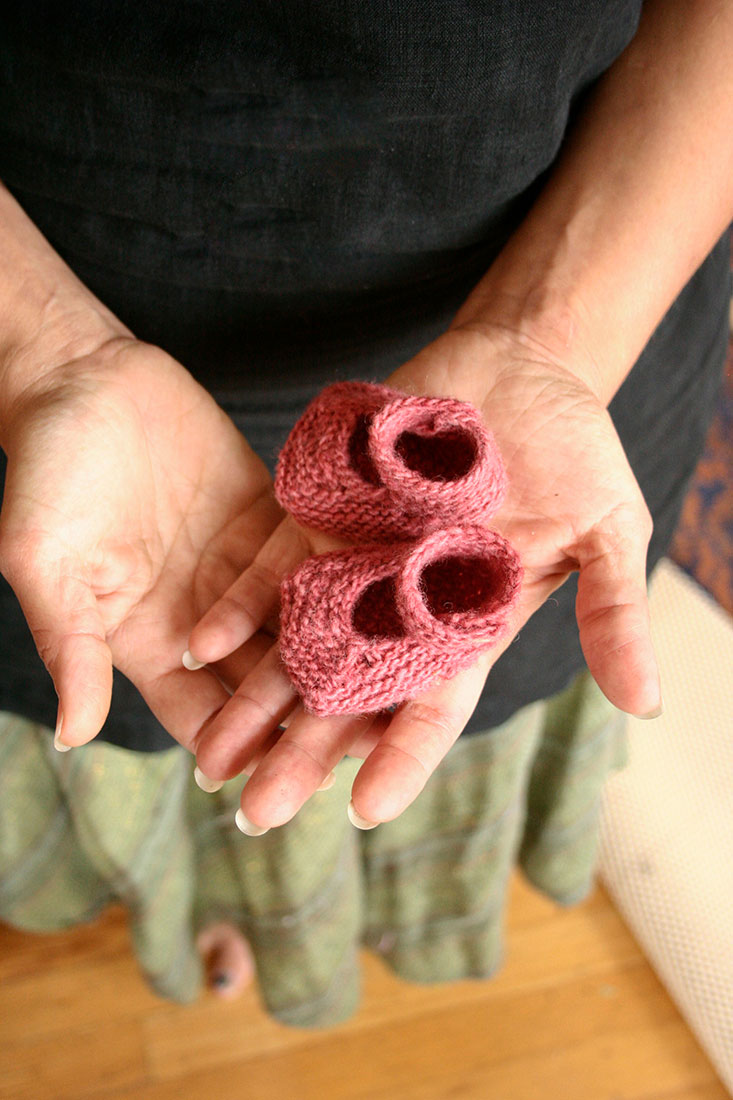
Meet Monica Paz Soldan of Tiny Textiles at the 2014 Fibershed Wool & Fine Fiber Symposium on November 15th at the Dance Palace in Point Reyes Station, where she will be selling her goods (ranging from infant to adult sizes) in the main hall. Tickets available starting September 15th. Tiny Textiles products are also available online in the Fibershed Marketplace and Ecohabitude; custom order requests are welcome.
